Panera
Descripción
Como professional bread loaf pan manufacturer, Bonray specializes in producing baking pans made from heavy-duty carbon steel with certified nonstick coatings to ensure long-lasting performance and ease of use. Available in multiple sizes, our loaf pans meet the demands of both retail and commercial baking operations.
Understanding the unique needs of our clients, we offer customized solutions, including size adjustments, private-label branding, and exclusive designs. Whether you are launching a new product line, outfitting a large-scale bakery, or expanding your retail offerings, we provide tailored bakeware solutions that set your business apart.
Características
- Material superior para una mayor durabilidad
- El diseño óptimo garantiza una distribución uniforme del calor
- Superficie antiadherente superior que garantiza una fácil liberación
- Materiales ecológicos para prácticas sostenibles
- Personalización preparada para mejorar la visibilidad de la marca.
- El material y el revestimiento resistentes a la oxidación prolongan la vida útil
- Múltiples aplicaciones para varias recetas
- Altas normas de inspección con certificado de calidad alimentaria
- Diseño para evitar fugas de masa asegurando un horno limpio.
- Bordes lisos para una manipulación segura
¿Listo para elevar la oferta de su panadería?
Póngase en contacto con nosotros hoy mismo para solicitar una muestra o hablar de sus necesidades específicas.
Featured Products of Professional Loaf Pan
Fabricadas en metal de alta calidad apto para uso alimentario y con una superficie antiadherente que garantiza un desprendimiento sin esfuerzo y un horneado uniforme, nuestras sartenes están diseñadas para mejorar su oferta culinaria y aumentar sus ventas.
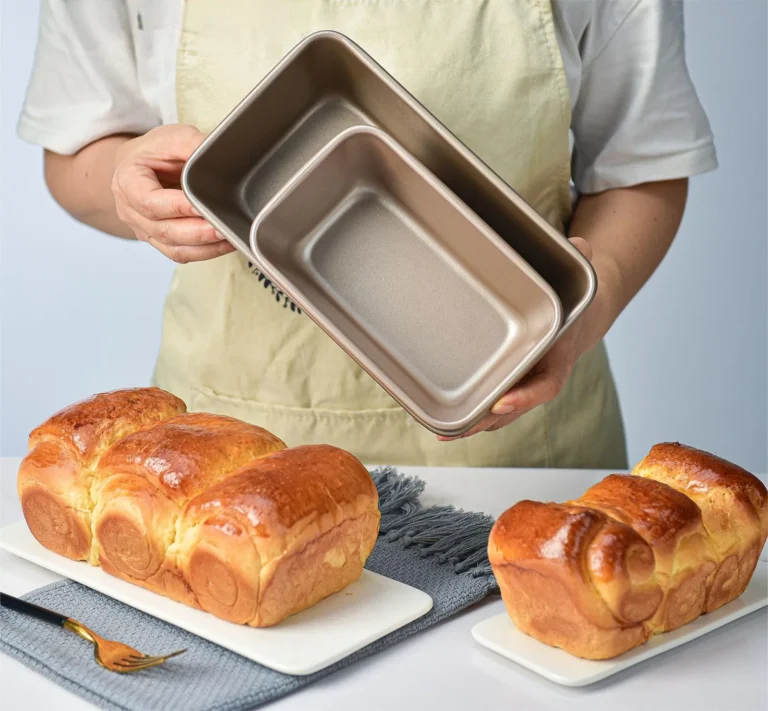
1 lb and 2 lb Loaf Pan Set
- Dimension: 1lb Pan: 18.6 x 11.6 x 6.5 cm (296g), 2lb Pan: 24.4 x 14.6 x 6.9 cm (502g)
- Material: Acero al carbono
- Tratamiento de superficie: Revestimiento antiadherente Whitford
- Heat Resistance: Up to 230°C for consistent baking in commercial environments
- Embalaje: Cada uno en una bolsa de polietileno, 20 piezas en una caja de cartón principal
- Soluciones a medida: Los tamaños, diseños, logotipos de marca, costes, materiales y envases de las bandejas pueden personalizarse.
- Material disponible: acero al carbono, acero aluminizado
- Marcas de acabado: Xynflon, Whitford, Ilag, KFCC Ceramica marcas de revestimiento antiadherente están todos disponibles.
9.5 Inch Bread Loaf Pan
- Dimension: 24.3*14.5*7.2 cm,
- Material: Acero al carbono
- Tratamiento de superficie: Revestimiento antiadherente Whitford
- Embalaje: Cada uno en una bolsa de polietileno, 20 piezas en una caja de cartón principal
- Soluciones a medida: Los tamaños, diseños, logotipos de marca, costes, materiales y envases de las bandejas pueden personalizarse.
- Material disponible: acero al carbono, acero aluminizado
- Marcas de acabado: Xynflon, Whitford, Ilag, KFCC Ceramica marcas de revestimiento antiadherente están todos disponibles.
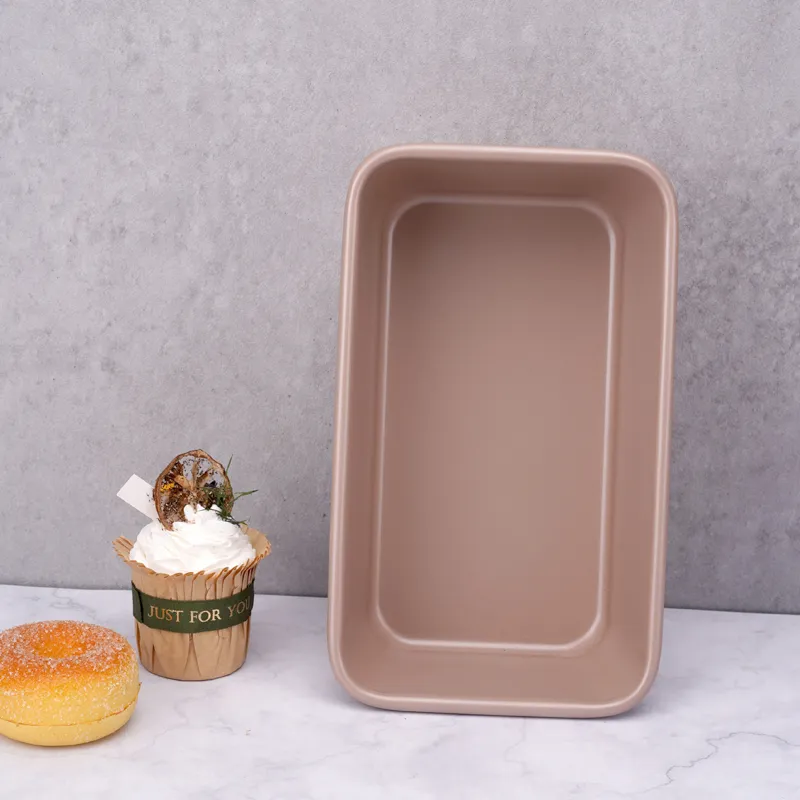
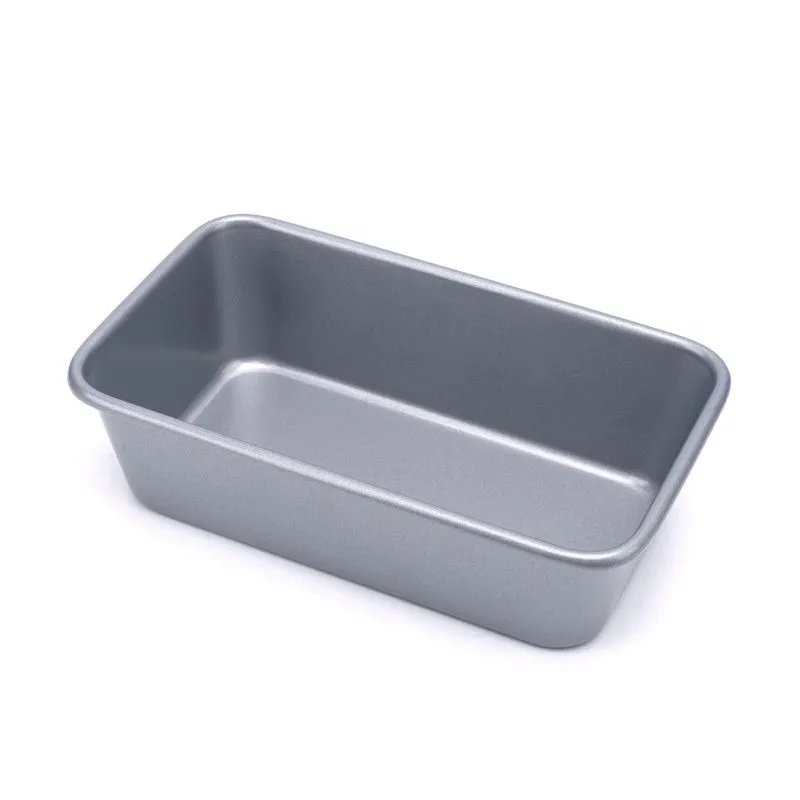
9.5 Inch Nonstick Bread Loaf Pan
- Dimension: 24.3*14.5*7.2 cm,
- Material: Acero al carbono
- Tratamiento de superficie: Revestimiento antiadherente Whitford
- Embalaje: Cada uno en una bolsa de polietileno, 20 piezas en una caja de cartón principal
- Soluciones a medida: Los tamaños, diseños, logotipos de marca, costes, materiales y envases de las bandejas pueden personalizarse.
- Material disponible: acero al carbono, acero aluminizado
- Marcas de acabado: Xynflon, Whitford, Ilag, KFCC Ceramica marcas de revestimiento antiadherente están todos disponibles.
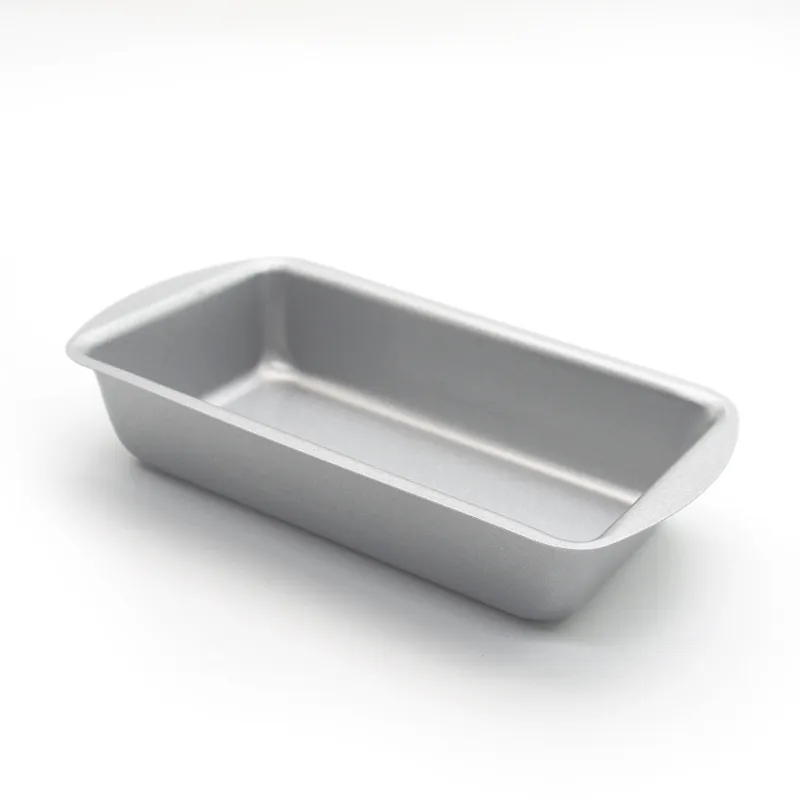
5 Inch Rectangle Loaf Pan with Wider Grips
- Dimension: 14*8*2.8cm
- Material: Acero al carbono
- Surface Treatment: Whitford Nonstick Coating any colors available
- Packaging: Each in one polybag, 200 pcs in one master carton
- Soluciones a medida: Los tamaños, diseños, logotipos de marca, costes, materiales y envases de las bandejas pueden personalizarse.
- Material disponible: acero al carbono, acero aluminizado
- Marcas de acabado: Xynflon, Whitford, Ilag, KFCC Ceramica marcas de revestimiento antiadherente están todos disponibles.
quiénes somos
Bread Loaf Pan Manufacturer and Supplier in China
As a trusted metal fabricante de utensilios para hornear in China, Bonray specializes in high-quality loaf bread pans for wholesalers, retailers, and commercial bakeries worldwide. With 15+ years of experience, we deliver durable, customizable bakeware that meets global standards. Our strong supply chain, advanced production capabilities, and strict quality control ensure reliable products, competitive pricing, and on-time delivery.
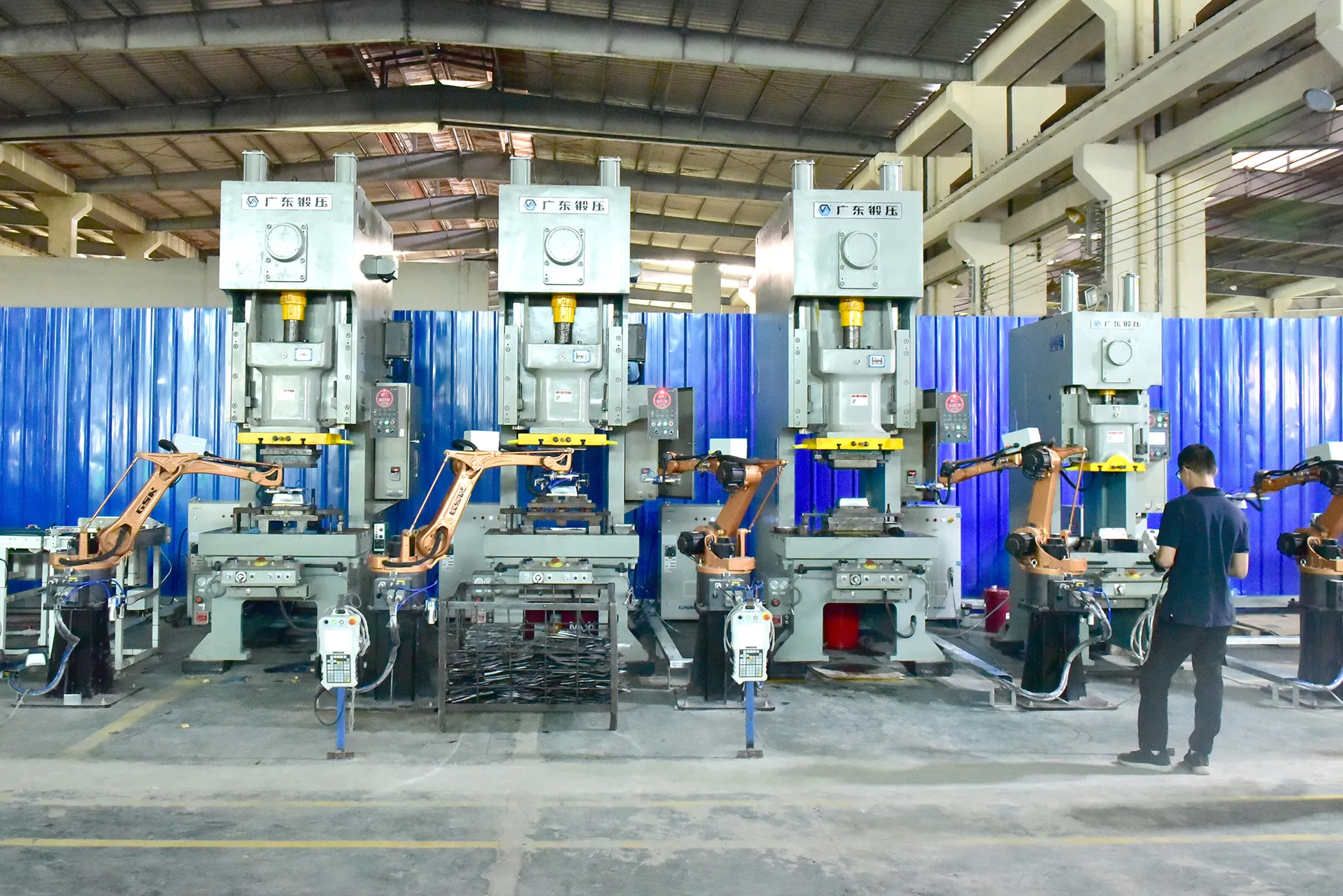
Custom Bread Loaf Pans From Concept to Commercialization
At Bonray, we turn your ideas into reality. Our professional team collaborates closely with you to bring your custom loaf pan designs to life. We analyze the feasibility of mass production based on your concepts and provide tailored recommendations to optimize designs for efficient manufacturing. By leveraging our advanced production processes, we ensure your customized loaf pans are not only visually appealing but also practical, cost-effective, and ready for the market. Let’s make your products stand out.
Paso 1
Collaborate with our experts to discuss your ideas, requirements, and business goals for custom loaf pans.
Paso 2
We evaluate design feasibility and suggest improvements to ensure efficient, cost-effective mass production.
Paso 3
Develop precise molds and prototypes to bring your design vision to life with accuracy and speed.
Etapa 4
Optimize designs based on prototype feedback for superior performance, durability, and market appeal.
Paso 5
Manufacture with precision and enforce strict quality checks to meet international standards and your expectations.
Paso 6
Timely delivery with dedicated support to ensure long-term satisfaction and seamless product integration.
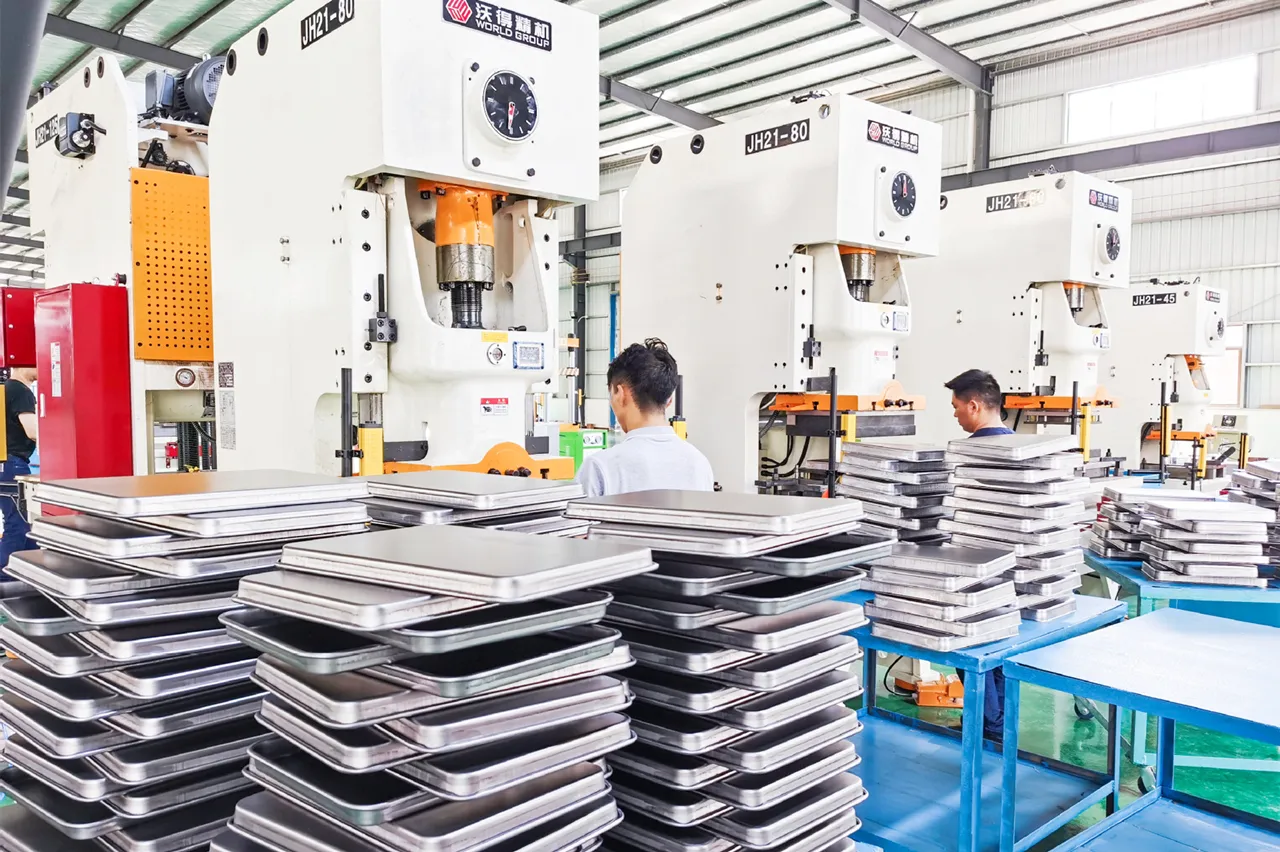
Por qué elegirnos
Reliable Bakeware Solutions Designed to Meet Your Business Needs
At Bonray, we don’t just manufacture bakeware; we help you grow your business with reliable, customized solutions.
Tailored designs, sizes, and branding to meet your unique market needs.
Efficient processes guarantee cost-effective solutions and punctual shipments.
Dedicated teams for design consultation, production updates, and after-sales assistance.
Bread Loaf Pan:
Guía completa de 2025
Are you struggling to find the perfect bread loaf pan for your business? Are you overwhelmed by the variety of options available or unsure about the quality and durability of different pans? Are you concerned about investing in bulk purchases without knowing which pans will best suit your needs and deliver consistent results?
This comprehensive guide addresses these concerns, helping buyers make informed decisions when sourcing bread loaf pans for their businesses.
Tabla de contenido
What are Bread Loaf Pans?
Bread loaf pans, also known as bread pans, are essential kitchen tools specifically designed for baking bread. Their rectangular shape and tall, straight sides allow for the dough to rise evenly, resulting in a uniform loaf. They are a staple in both home and commercial kitchens, playing a crucial role in creating uniform, well-formed loaves of bread. These pans come in various materials, sizes, and designs, each offering unique features that cater to different baking needs.
What are the Unique Features of Loaf Pans?
1. Material Options
Bread loaf pans are primarily made from:
- Metal: Aluminum and steel are common choices due to their excellent heat conductivity. Many metal pans come with non-stick coatings, making it easier to release the baked bread.
- Vidrio: Heat-resistant glass pans allow bakers to monitor the browning of the bread without removing it from the oven.
- Silicona: Flexible silicone pans offer a non-stick surface and are easy to clean, although they may not provide the same level of heat conduction as metal.
2. Non-Stick Coatings
Many modern bread loaf pans feature non-stick surfaces that facilitate easy removal of baked goods. This is particularly beneficial for sticky doughs or recipes that require precise shapes. Non-stick coatings also simplify cleanup, allowing bakers to spend less time scrubbing after baking.
3. Variety of Sizes
Bread loaf pans come in various sizes, accommodating different recipes and portion sizes. Standard sizes typically range from 8.5 x 4.5 inches to 9 x 5 inches, but larger or smaller options are available for specialized baking needs.
4. Lid Options
Some loaf pans are designed with lids that help create a steamy environment during baking. This feature is particularly useful for achieving a soft crust and better rise in breads like brioche o sandwich loaves. The lid can also be removed towards the end of baking to achieve a crispy crust.
5. Durability and Design
High-quality bread loaf pans are constructed to withstand high temperatures and frequent use without warping or degrading. Features such as reinforced edges and heavy-gauge materials enhance durability and performance. Some designs include handles for easier manipulation, especially when hot.
What sizes are available for commercial bread loaf pans?
Bread loaf pans come in a variety of sizes, typically ranging from small (5×3 inches) to large (12×4 inches). Common design features include:
1. Standard Sizes
- 8.5″ x 4.5″: This size is often used for traditional sandwich breads and is ideal for recipes using around 3 cups of flour. It typically produces a nicely domed loaf.
- 9″ x 5″: Another popular size, this pan is suitable for quick breads and recipes that require slightly more dough, usually around 3.5 to 4 cups of flour. It results in a shorter loaf compared to the 8.5″ x 4.5″ pan.
2. Larger Sizes
- 10″ x 5″ (Pain de Mie Pan): This size is used for larger loaves, often accommodating recipes with 4 cups of flour or more. It’s perfect for making bakery-style loaves that are denser and taller.
- 12″ x 4″ or 12″ x 6″: These pans are designed for even larger loaves, often used in commercial settings to produce bigger batches of bread.
3. Mini Loaf Pans
- 5.75″ x 3″: Mini loaf pans are great for smaller portions or gift loaves. They typically hold about half the volume of standard pans and are perfect for quick breads or pound cakes.
4. Specialty Pans
- 1-pound loaf pans: These pans are designed specifically for recipes that yield smaller loaves, often used for pound cakes or other dense bread types.
- 2-pound loaf pans: Ideal for larger grocery store-style loaves, these pans can hold recipes that require significant amounts of dough.
What materials are used to make bread loaf pans, and how do they differ?
Bread loaf pans are made from various materials, each offering distinct advantages and disadvantages that can affect baking performance. Here’s a detailed overview of the most common materials used to make bread loaf pans and how they differ:
1. Aluminum
Aluminio is one of the most popular materials for loaf pans due to its excellent heat conductivity. It heats up quickly and evenly, which helps achieve a well-browned crust. Aluminum pans are typically lightweight and affordable, making them accessible for both home bakers and professionals. However, they can be prone to scratching, especially if they have a non-stick coating. Uncoated aluminum pans are also susceptible to discoloration over time but do not affect baking performance.
2. Aluminized Steel
Acero aluminizado combines the durability of steel with the heat conductivity of aluminum. This material features a steel core coated with an aluminum alloy, providing strength while promoting even baking. Aluminized steel pans resist warping and are often favored in professional kitchens for their reliability and performance. They typically produce well-browned loaves and are less likely to dent compared to standard aluminum pans.
3. Stainless Steel
Acero inoxidable loaf pans are known for their durability and resistance to rust. While they do not conduct heat as effectively as aluminum, they are dishwasher-safe and do not react with acidic ingredients, making them a safe choice for various recipes. However, stainless steel pans may result in less browning compared to aluminum or aluminized steel options. For optimal results, it is recommended to choose dull stainless steel pans rather than shiny ones, as dull surfaces promote better crust development.
4. Silicone
Silicona loaf pans have gained popularity due to their flexibility and non-stick properties. They are lightweight, easy to clean, and can withstand high temperatures without warping. Silicone pans cool quickly, allowing baked goods to release easily without sticking. However, they may not provide the same level of heat conduction as metal pans, which can affect baking times and results. Additionally, silicone pans can buckle under heavy weights if placed on wire racks.
5. Glass
Vidrio loaf pans allow bakers to monitor the browning of their bread without removing it from the oven. They are durable and microwave-safe but have some drawbacks: glass takes longer to heat up and cool down compared to metal pans, which can lead to uneven baking—often resulting in undercooked centers or over-browned exteriors. To compensate for this, bakers may need to adjust baking temperatures or times.
6. Ceramic
Ceramic loaf pans are less common but offer aesthetic appeal along with decent baking performance. Similar to glass, they provide even heat distribution but may heat up more slowly than metal options. Most ceramic pans come in attractive designs that can double as serving dishes.
7. Cast Iron
Cast iron loaf pans excel in heat retention and distribution, resulting in beautifully browned loaves with a crispy crust. They are heavier than other materials and require more care (such as seasoning) to maintain their non-stick properties.
Despite the extra effort needed for care, many bakers prefer cast iron for its superior baking results.
Choosing the right material for your bread loaf pan depends on your baking style and preferences. Each material—whether aluminum’s quick heating properties or silicone’s ease of use—offers unique benefits that can enhance your baking experience. Understanding these differences will help you select the best pan for your specific needs.
How does price affect bulk purchases of bread loaf pans?
Pricing is a critical factor for bulk buyers. Factors influencing price include:
- Material Cost: Stainless steel pans typically cost more than aluminum or carbon steel.
- Quantity: Larger orders often attract discounts.
- Personalización: Adding logos, unique designs, or packaging increases costs.
Collaborating with reliable suppliers ensures competitive pricing without compromising quality.
Las opciones de revestimiento más populares son:
- PTFE Revestimientos antiadherentes
- Revestimientos cerámicos antiadherentes
- Recubrimientos a base de silicona
- Acabados anodizados para moldes de aluminio
Los revestimientos antiadherentes están muy solicitados, con estudios de mercado demostrando que 61.8% de los consumidores prefieren los productos antiadherentes para hornear. Sin embargo, los compradores preocupados por su salud están cada vez más interesados en alternativas sin PTFE.
How to customize bread loaf pans for specific markets?
Customization enhances brand appeal. Options include:
- Embossed Logos: Build brand recognition by adding your logo.
- Unique Dimensions: Cater to niche markets with specific size requirements.
- Special Packaging: Attract consumers with visually appealing boxes or eco-friendly wraps.
Customized products align with your brand identity, making them a worthwhile investment for retail and promotional purposes.
¿Qué factores debo tener en cuenta al evaluar la cualificación de los proveedores?
- Capacidad de producción
Asegúrese de que el proveedor tiene capacidad para satisfacer sus necesidades de pedidos al por mayor. Compruebe sus instalaciones y capacidades de producción. - Control de calidad
Un proveedor fiable debe contar con estrictas medidas de control de calidad para garantizar una calidad constante del producto. - Opciones de personalización
Si necesita diseños o marcas personalizados, compruebe si el proveedor ofrece servicios OEM/ODM. - Plazos de entrega
La puntualidad en la entrega es crucial. Verifique el plazo de entrega del proveedor y su capacidad para cumplir los plazos. - Precios y condiciones
Compare los precios de distintos proveedores, pero tenga en cuenta también el valor global, incluida la calidad y el servicio.
What certifications should buyers look for when sourcing loaf pans?
Entre las certificaciones importantes se incluyen:
- Aprobación de la FDA para el contacto con alimentos
- Certificación LFGB (Código alemán de alimentos, artículos de uso cotidiano y piensos)
- Conformidad con Prop 65 (para mercados de California)
- ISO 9001 para la gestión de la calidad
- Certificación sin BPA para revestimientos
How can buyers ensure consistent quality when ordering bakeware loaf pan pans in bulk?
Para mantener la coherencia de la calidad:
- Solicitar muestras de productos para pruebas
- Realizar auditorías periódicas de las fábricas
- Aplicar estrictas medidas de control de calidad
- Establecer especificaciones y tolerancias claras
- Utilizar servicios de inspección de terceros
Los estudios sobre la cadena de suministro demuestran que la aplicación de estas medidas puede reducir los índices de defectos hasta en un 10%. 80%.
How to identify a reliable bread loaf pan supplier?
Identificar a un proveedor fiable implica varios pasos:
1. Investigación y reseñas: Busque proveedores con reseñas positivas y una buena reputación en el sector.
2. Certificaciones: Compruebe si cuenta con certificaciones estándar del sector, como ISO 9001, que indica la existencia de sólidos sistemas de gestión de la calidad.
3. Pruebas de muestras: Solicite muestras antes de realizar compras al por mayor para evaluar la calidad de primera mano.
4. Visitas a la fábrica: Si es posible, visite la fábrica del proveedor para ver su proceso de producción y sus medidas de control de calidad.
5. Atención al cliente: Los proveedores fiables ofrecen un excelente servicio de atención al cliente, que incluye respuestas rápidas y asistencia posventa.
What makes Bonray a trusted supplier for loaf baking pans?
En Bonraynos enorgullecemos de nuestra sólida cadena de suministro, nuestra completa línea de productos y nuestras estrictas normas de control de calidad en el sector de los utensilios de metal para hornear. He aquí por qué destacamos:
1. High-Quality Materials: We use durable, non-stick aluminum, carbon steel, aluminized steel and stainless steel to ensure even baking and cooking longevity.
2. Customization: We offer extensive customization options to meet your specific needs, including size, shape, and branding.
3. Professional Technical Capabilities: Our team has vast experience in product manufacturing and design, ensuring high-quality products.
4. Marketing Support: We provide marketing advice to help you promote your products effectively.
5. Reliable Delivery: With advanced manufacturing techniques and an experienced team of experts, we have the capacity to meet large orders and deliver on time.
What are the key tests Bonray usually performs to evaluate the quality of non-stick coatings on loaf bread pans?
Como fabricante profesional de utensilios para hornearBonray realiza varias pruebas cruciales para evaluar la calidad del revestimiento antiadherente:
- Examen de dureza
- Prueba de resistencia a la abrasión
- Prueba de adhesión
- Prueba de resistencia a la sal
- Prueba de resistencia al impacto
- Pruebas de resistencia a ácidos y álcalis
- Pruebas de rendimiento antiadherente
Según las normas del sector, estas pruebas garantizan que los revestimientos antiadherentes cumplen los criterios de durabilidad y rendimiento exigidos.
¿Cómo se mide la dureza de un revestimiento antiadherente?
La prueba de dureza consiste en:
- Utilización de lápices de dureza creciente
- Presionándolas en un ángulo de 45° sobre la superficie del revestimiento bajo una carga de 1000 g.
- Moviéndolos hacia adelante y hacia atrás 100mm
- Repetir 10 veces por dureza del lápiz
- Cambiar de lápiz hasta que aparezcan rayas
Un revestimiento antiadherente de calidad debe alcanzar una dureza de lápiz de al menos 3H para ser considerado suficientemente duradero para aplicaciones de horneado.
What does the abrasion resistance test involve for loaf bread baking pans?
La prueba de resistencia a la abrasión incluye:
- Con un estropajo (70 mm x 30 mm)
- Aplicando una fuerza de 15N a la superficie del revestimiento
- Desplazamiento hacia delante y hacia atrás de 100 mm a 33 veces/minuto
- Repitiendo para 4000 ciclos
Los revestimientos de alta calidad no deben presentar más de 10 arañazos lineales de más de 2 mm de longitud después de esta prueba, y sólo se permite una ligera decoloración de la superficie.
¿Cómo se evalúa la adherencia de los revestimientos antiadherentes?
El prueba de adherencia implica:
- Cortar una cuadrícula de 1x1 mm en el revestimiento con un cuchillo o un comprobador de corte transversal.
- Aplicación de cinta 3M en la zona de la rejilla
- Despegar la cinta
- Observación del estado del revestimiento
Las normas de calidad indican que la adherencia debe estar comprendida entre los grados 0-2, siendo los grados inferiores los que indican una mejor adherencia.
What is the significance of the thermal shock stability test for bread loaf pans?
El ensayo de estabilidad al choque térmico evalúa la capacidad del revestimiento para soportar cambios rápidos de temperatura:
- Calentar la sartén a 250°C±5°C durante 5 minutos
- Sumergirlo en agua a temperatura ambiente durante 1 minuto
- Repetir 5 veces
Esta prueba simula condiciones de uso extremas. Un revestimiento de alta calidad no debería mostrar ampollas ni grietas después de esta prueba, lo que garantiza su durabilidad en situaciones reales de horneado.
How is the non-stick performance of loaf baking pans tested?
Dos pruebas principales evalúan rendimiento antiadherente:
- Prueba antiadherente Pancake (para productos de panadería):
- Se trata de hornear tortitas sin aceite 10 veces
- Comprueba que se desprende fácilmente y deja un residuo mínimo
- Prueba de freír huevos:
- Freír huevos sin aceite durante 3 ciclos a 150-170°C
- 9/10 huevos deben extraerse intactos
- Cualquier residuo debe limpiarse fácilmente
Estas pruebas simulan situaciones reales de cocinado para garantizar que las propiedades antiadherentes cumplen las expectativas de los consumidores.
Why are acid and alkali resistance tests important for loaf pans?
Las pruebas de resistencia a ácidos y álcalis evalúan la capacidad del revestimiento para soportar diversos ingredientes alimentarios y agentes de limpieza:
- Resistencia a los ácidos: Utiliza solución de ácido acético 2%
- Resistencia a los álcalis: Utiliza solución de carbonato sódico 2%
Ambas pruebas consisten en exponer el revestimiento a estas soluciones durante 2 horas. Los revestimientos de calidad no deben presentar ampollas, manchas ni descamación tras estas pruebas, lo que garantiza su longevidad y la seguridad alimentaria.
Conclusión
Choosing the right loaf baking pans is crucial for any baking business. By considering the factors mentioned in this guide, you can make an informed decision and select the best pans for your consumers. At Bonray, we are committed to providing high-quality products and excellent customer service to help you succeed in your business.
Manténgase al día de las tendencias del sector y dé prioridad al control de calidad para garantizar el éxito a largo plazo en el competitivo mercado de los utensilios para hornear.

Tiffany Lai
Hola, soy Tiffany, la cofundadora de Bonray Homewares.
Como experto en fabricación de metales y proveedor de productos para el hogar, tengo una amplia experiencia en la fabricación y el diseño de productos para proporcionar utensilios de cocina de alta calidad, como bandejas de horno, sartenes y moldes, a clientes de todo el mundo.
En los últimos 14 años, hemos ayudado a 35 países y a más de 100 clientes como TJX, Sam's Club, Home Depot, Costco y otras marcas privadas a lanzar más de 150 productos personalizados de nuevo diseño. Mi objetivo es compartir mis conocimientos y mi visión de la industria del menaje de cocina, garantizando que nuestros clientes reciban los mejores productos y servicios para satisfacer sus necesidades.

